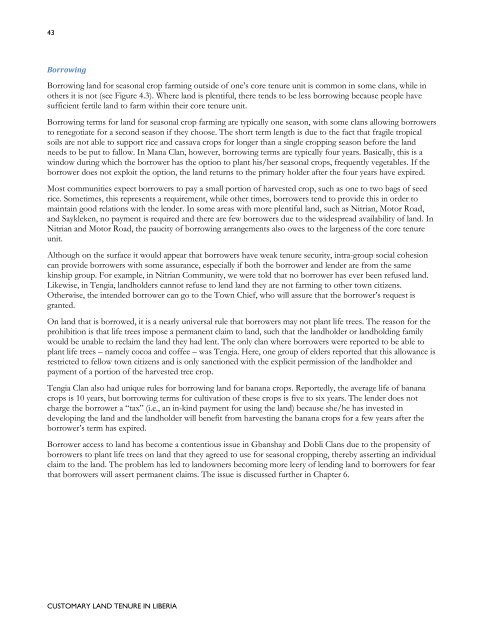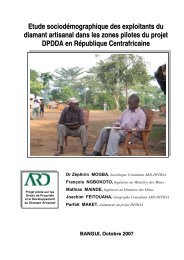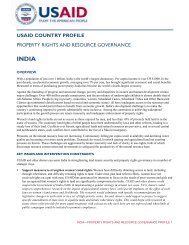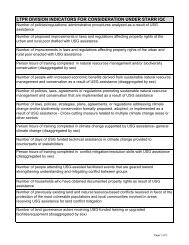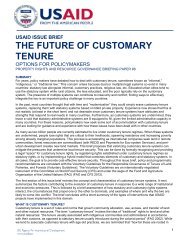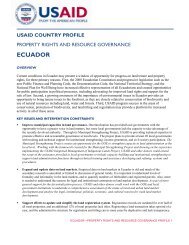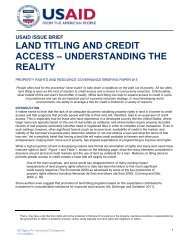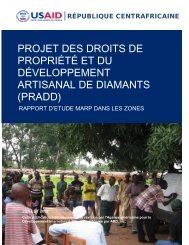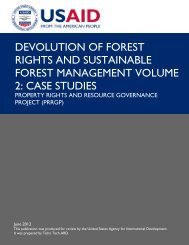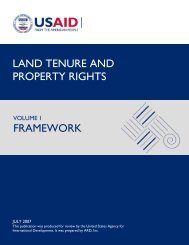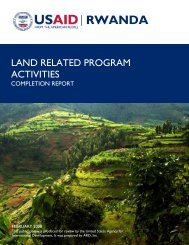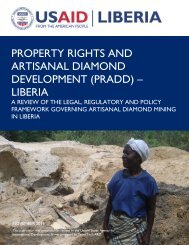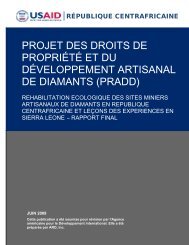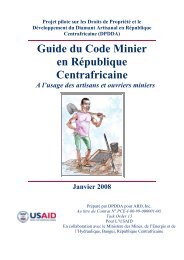Customary Land Tenure in Liberia - Land Tenure and Property ...
Customary Land Tenure in Liberia - Land Tenure and Property ...
Customary Land Tenure in Liberia - Land Tenure and Property ...
You also want an ePaper? Increase the reach of your titles
YUMPU automatically turns print PDFs into web optimized ePapers that Google loves.
43<br />
Borrow<strong>in</strong>g<br />
Borrow<strong>in</strong>g l<strong>and</strong> for seasonal crop farm<strong>in</strong>g outside of one‟s core tenure unit is common <strong>in</strong> some clans, while <strong>in</strong><br />
others it is not (see Figure 4.3). Where l<strong>and</strong> is plentiful, there tends to be less borrow<strong>in</strong>g because people have<br />
sufficient fertile l<strong>and</strong> to farm with<strong>in</strong> their core tenure unit.<br />
Borrow<strong>in</strong>g terms for l<strong>and</strong> for seasonal crop farm<strong>in</strong>g are typically one season, with some clans allow<strong>in</strong>g borrowers<br />
to renegotiate for a second season if they choose. The short term length is due to the fact that fragile tropical<br />
soils are not able to support rice <strong>and</strong> cassava crops for longer than a s<strong>in</strong>gle cropp<strong>in</strong>g season before the l<strong>and</strong><br />
needs to be put to fallow. In Mana Clan, however, borrow<strong>in</strong>g terms are typically four years. Basically, this is a<br />
w<strong>in</strong>dow dur<strong>in</strong>g which the borrower has the option to plant his/her seasonal crops, frequently vegetables. If the<br />
borrower does not exploit the option, the l<strong>and</strong> returns to the primary holder after the four years have expired.<br />
Most communities expect borrowers to pay a small portion of harvested crop, such as one to two bags of seed<br />
rice. Sometimes, this represents a requirement, while other times, borrowers tend to provide this <strong>in</strong> order to<br />
ma<strong>in</strong>ta<strong>in</strong> good relations with the lender. In some areas with more plentiful l<strong>and</strong>, such as Nitrian, Motor Road,<br />
<strong>and</strong> Saykleken, no payment is required <strong>and</strong> there are few borrowers due to the widespread availability of l<strong>and</strong>. In<br />
Nitrian <strong>and</strong> Motor Road, the paucity of borrow<strong>in</strong>g arrangements also owes to the largeness of the core tenure<br />
unit.<br />
Although on the surface it would appear that borrowers have weak tenure security, <strong>in</strong>tra-group social cohesion<br />
can provide borrowers with some assurance, especially if both the borrower <strong>and</strong> lender are from the same<br />
k<strong>in</strong>ship group. For example, <strong>in</strong> Nitrian Community, we were told that no borrower has ever been refused l<strong>and</strong>.<br />
Likewise, <strong>in</strong> Tengia, l<strong>and</strong>holders cannot refuse to lend l<strong>and</strong> they are not farm<strong>in</strong>g to other town citizens.<br />
Otherwise, the <strong>in</strong>tended borrower can go to the Town Chief, who will assure that the borrower‟s request is<br />
granted.<br />
On l<strong>and</strong> that is borrowed, it is a nearly universal rule that borrowers may not plant life trees. The reason for the<br />
prohibition is that life trees impose a permanent claim to l<strong>and</strong>, such that the l<strong>and</strong>holder or l<strong>and</strong>hold<strong>in</strong>g family<br />
would be unable to reclaim the l<strong>and</strong> they had lent. The only clan where borrowers were reported to be able to<br />
plant life trees – namely cocoa <strong>and</strong> coffee – was Tengia. Here, one group of elders reported that this allowance is<br />
restricted to fellow town citizens <strong>and</strong> is only sanctioned with the explicit permission of the l<strong>and</strong>holder <strong>and</strong><br />
payment of a portion of the harvested tree crop.<br />
Tengia Clan also had unique rules for borrow<strong>in</strong>g l<strong>and</strong> for banana crops. Reportedly, the average life of banana<br />
crops is 10 years, but borrow<strong>in</strong>g terms for cultivation of these crops is five to six years. The lender does not<br />
charge the borrower a “tax” (i.e., an <strong>in</strong>-k<strong>in</strong>d payment for us<strong>in</strong>g the l<strong>and</strong>) because she/he has <strong>in</strong>vested <strong>in</strong><br />
develop<strong>in</strong>g the l<strong>and</strong> <strong>and</strong> the l<strong>and</strong>holder will benefit from harvest<strong>in</strong>g the banana crops for a few years after the<br />
borrower‟s term has expired.<br />
Borrower access to l<strong>and</strong> has become a contentious issue <strong>in</strong> Gbanshay <strong>and</strong> Dobli Clans due to the propensity of<br />
borrowers to plant life trees on l<strong>and</strong> that they agreed to use for seasonal cropp<strong>in</strong>g, thereby assert<strong>in</strong>g an <strong>in</strong>dividual<br />
claim to the l<strong>and</strong>. The problem has led to l<strong>and</strong>owners becom<strong>in</strong>g more leery of lend<strong>in</strong>g l<strong>and</strong> to borrowers for fear<br />
that borrowers will assert permanent claims. The issue is discussed further <strong>in</strong> Chapter 6.<br />
CUSTOMARY LAND TENURE IN LIBERIA


